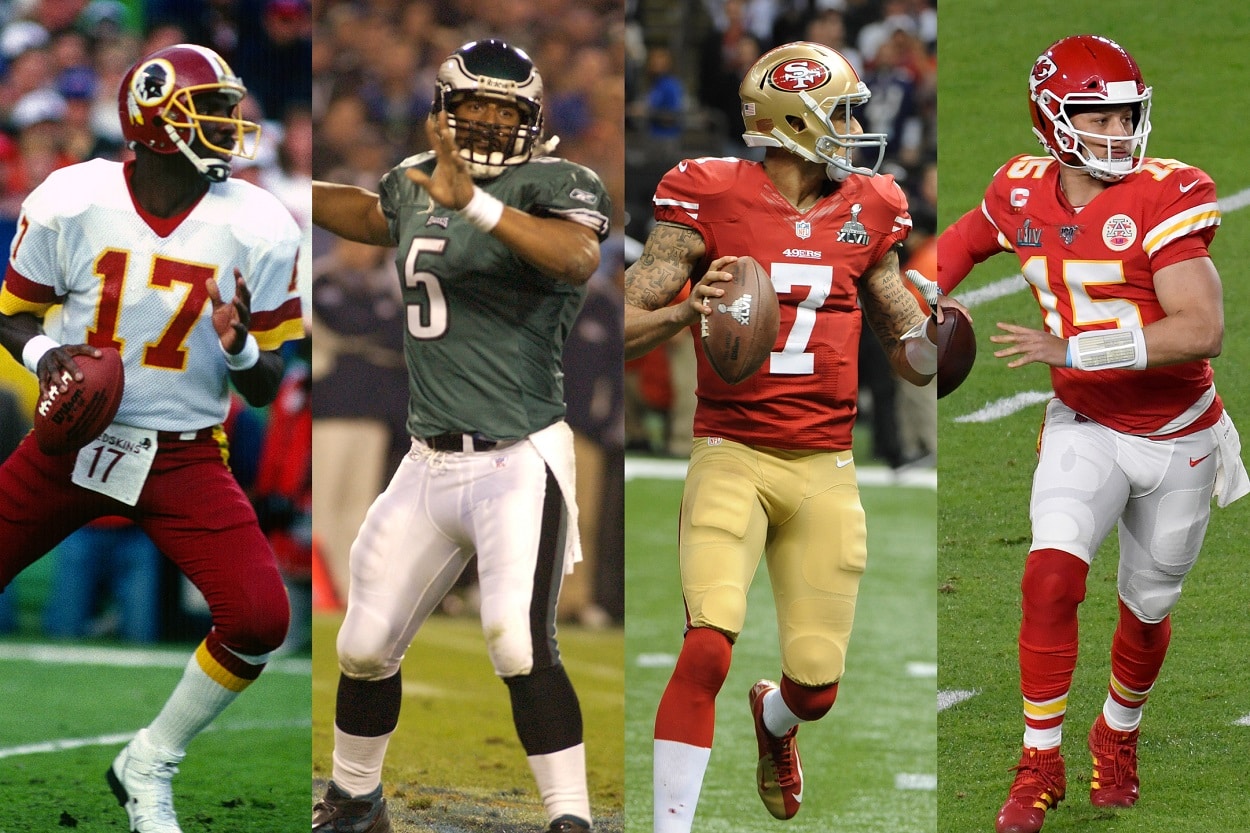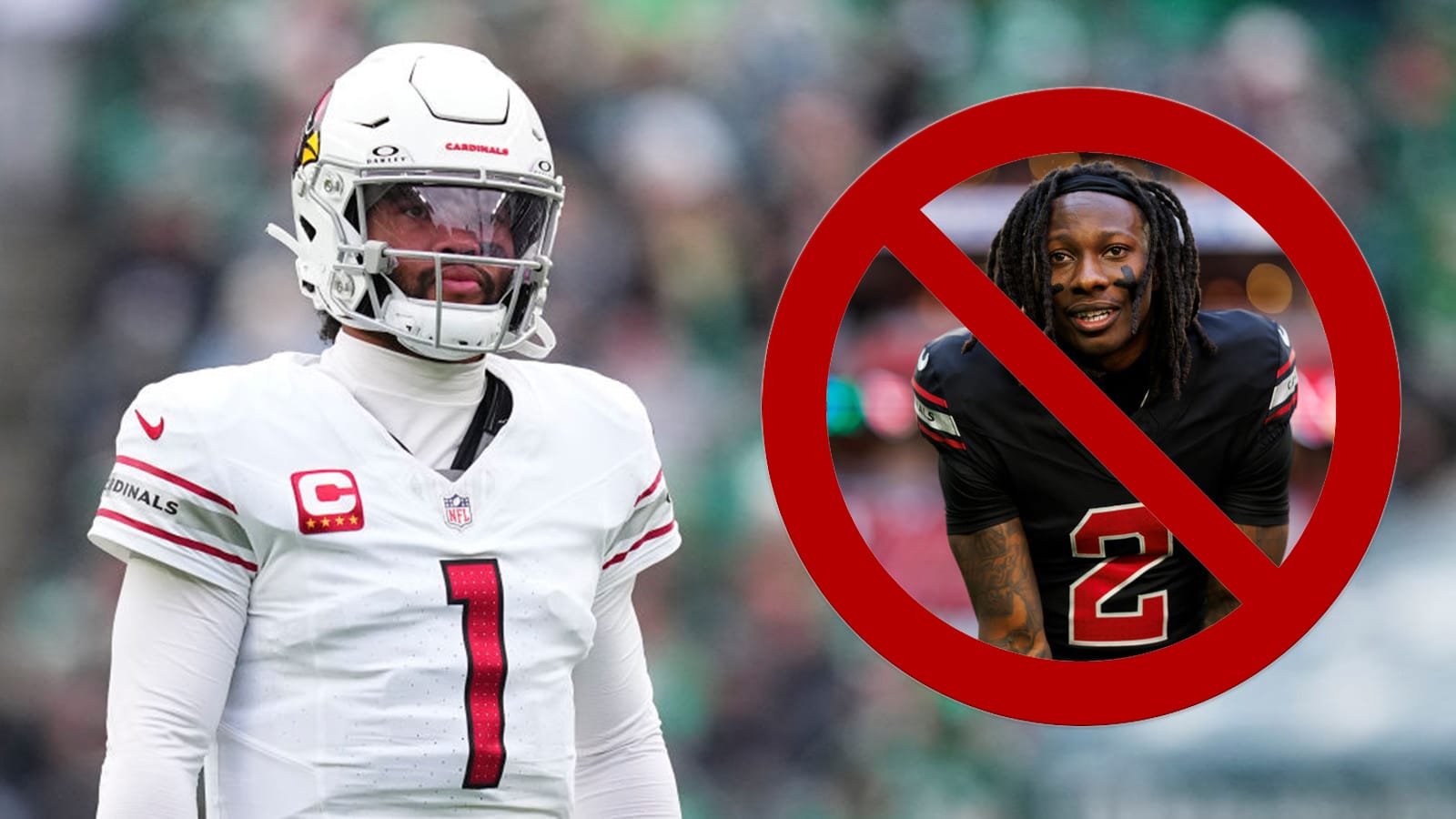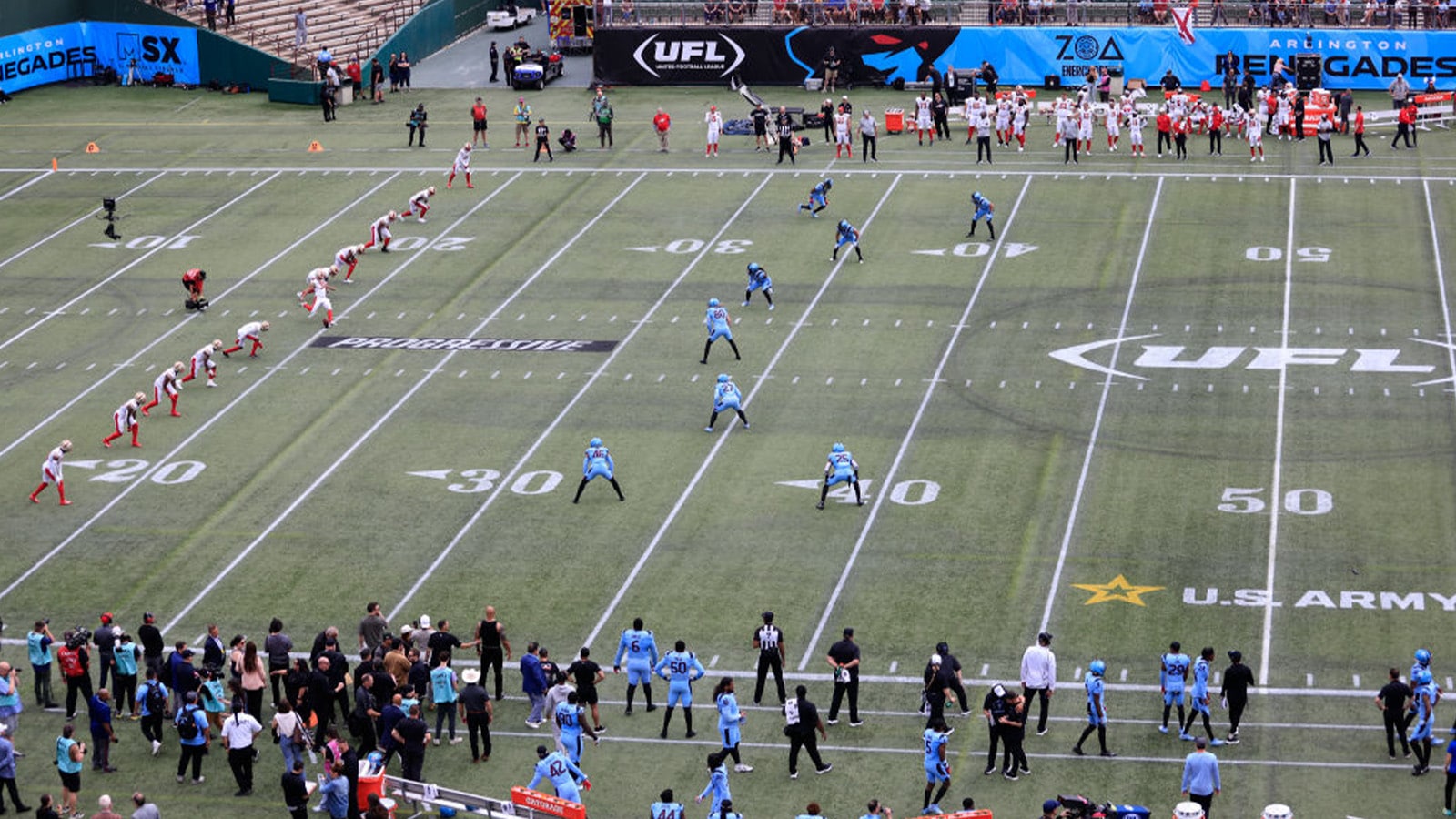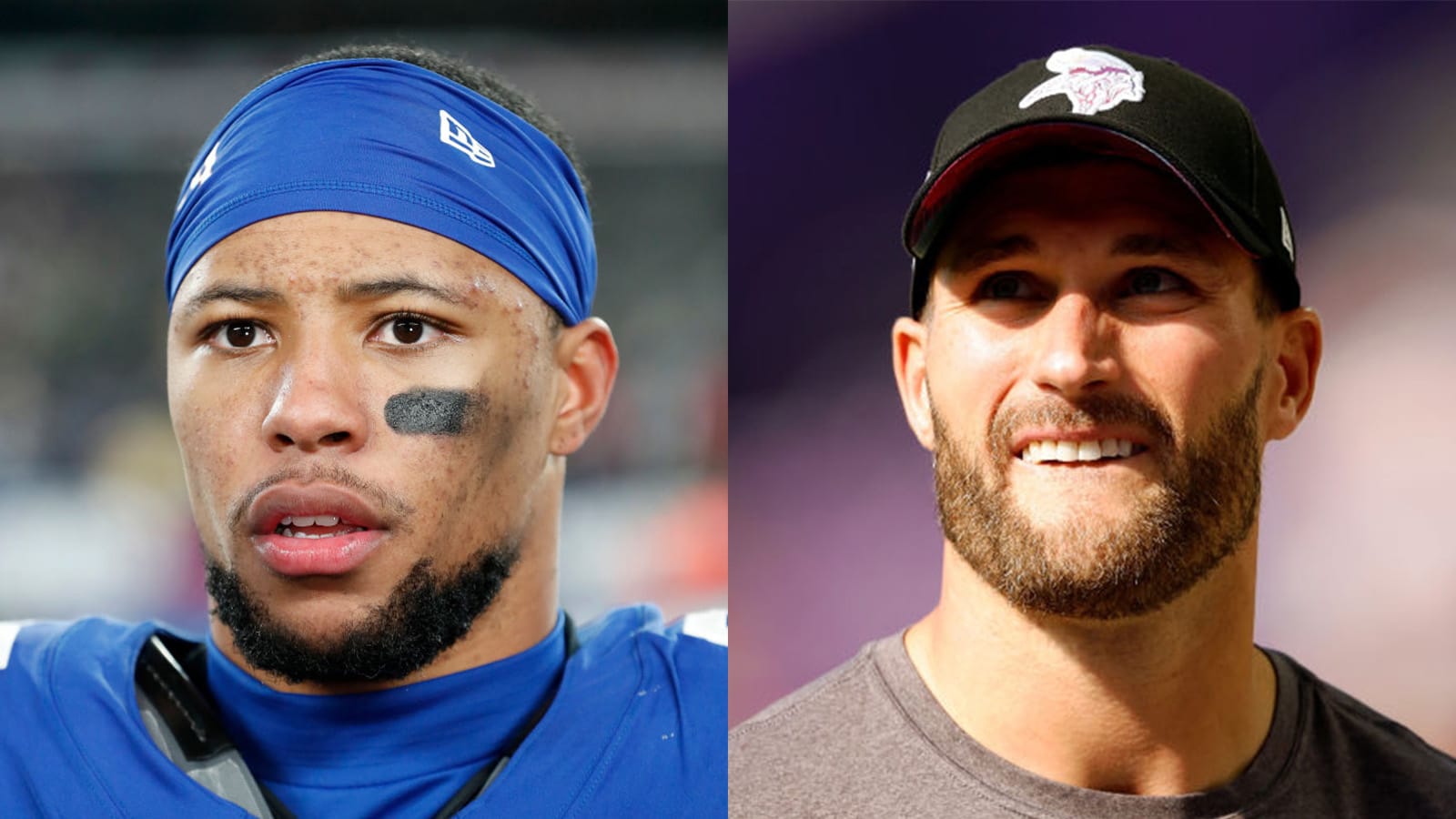
How Many Black Quarterbacks Have Started a Super Bowl?
NFL history was made at Super Bowl 57 as Patrick Mahomes and Jalen Hurts became the first two Black quarterbacks to compete against one another for the Lombardi Trophy.
While this was the third Super Bowl start for Mahomes, who’s one of three on this list to lead his team to a championship, it was the first for Hurts, who became the eighth Black quarterback to start the title game.
Doug Williams, Washington Commanders — Super Bowl 22
The first Black quarterback to start a Super Bowl was also the first to be taken in the first round of the NFL Draft.
Selected by Tampa Bay with the No. 17 overall pick in 1978, Doug Williams took the Buccaneers to the postseason three times in five years before a messy divorce led to his exit from the NFL. After spending time in the USFL, Williams returned to the NFL in 1986 with the franchise now known as the Washington Commanders.
In 1987, the Grambling State alum started just two games for Washington during the regular season but was named the starter for the postseason as head coach Joe Gibbs was unhappy with the play of regular starter Jay Schroeder.
After leading Washington to playoff wins over the Chicago Bears and Minnesota Vikings, Williams again got the start in Super Bowl 22 against the Denver Broncos and led his team to an easy 42-10 victory. En route to winning the game’s MVP award, he completed 18 of 29 passes for 340 yards, a record total at the time, and set another Super Bowl record by throwing all four of his touchdown passes in the second quarter.
Steve McNair, Tennessee Titans — Super Bowl 34
It took a dozen years after Williams’ brilliant performance for another Black quarterback to start a Super Bowl, that being Steve McNair of the Tennessee Titans.
Despite suffering an inflamed disk that required surgery and forced him to miss five games, the Alcorn State product helped his team to a 13-3 regular-season record and the No. 4 seed in the AFC.
Following victories over the Buffalo Bills, Indianapolis Colts, and the top-seeded Jacksonville Jaguars, the Titans matched up with Kurt Warner and the surprising St. Louis Rams in Super Bowl 34. While McNair completed 22 of 36 passes for 214 yards, he failed to throw a touchdown in a dramatic 23-16 loss.
Donovan McNabb, Philadelphia Eagles — Super Bowl 39
In 2004, Donovan McNabb led the Philadelphia Eagles to a 13-3 record, giving the team its fourth consecutive NFC East title.
As the No. 1 seed in the NFC, the Eagles took an easy victory over the Minnesota Vikings in the Divisional Round and then trounced the Atlanta Falcons in the NFC Championship Game, setting up a Super Bowl 39 showdown with the defending champion New England Patriots.
McNabb completed 30 of 51 passes for 357 yards with three touchdowns in the title game but also tossed three interceptions in a 24-21 loss.
Colin Kaepernick, San Francisco 49ers — Super Bowl 47
After sitting behind Alex Smith for a year and a half, Colin Kaepernick took over as the starting quarterback for the San Francisco 49ers during Week 10 of the 2012 season when Smith suffered a concussion.
Despite Smith being cleared to play a short time later, Jim Harbaugh stuck with Kaepernick, who went 5-2 in seven starts to close out the season, helping the Niners to an 11-4-1 record and the No. 2 seed in the NFC. He remained the starter for the postseason and set an NFL record with 181 rushing yards, the most ever by a quarterback in any NFL game, in a Divisional Round victory over the Green Bay Packers.
San Francisco then knocked off the Atlanta Falcons in the NFC title game, setting up a showdown with John Harbaugh’s Baltimore Ravens in Super Bowl 47. Kaepernick completed 16 of 28 passes for 302 yards with a touchdown and an interception and also rushed for a score. But the 49ers, who were down 21-6 at halftime, fell just short in their comeback attempt and took a 34-31 loss.
Russell Wilson, Seattle Seahawks — Super Bowl 48, Super Bowl 49
The fifth Black quarterback to start a Super Bowl — and the first to ever start two — was Russell Wilson, who led the Seattle Seahawks to back-to-back appearances following the 2013 and 2014 seasons.
In 2013, which was only Wilson’s second year in the league, the Seahawks went 13-3 to earn the top seed in the NFC. They bested the sixth-seeded New Orleans Saints in the Divisional Round and then defeated the fifth-seeded San Francisco 49ers in the NFC Championship Game to set up a showdown with the Denver Broncos in Super Bowl 48.
The Broncos, who had the highest-scoring offense in league history, were heavily favored, but behind a tremendous defensive effort and a highly efficient game from Wilson, who completed 72% of his passes for 206 yards and two touchdowns, the Seahawks took a 43-8 victory.
Following a 12-4 season the following year, Seattle returned to the Super Bowl to face Tom Brady and the New England Patriots. Wilson played well for most of the game, throwing for 247 yards and two touchdowns. But with his team trailing 28-24, he was famously intercepted by Malcolm Butler on the goal line with just 26 seconds remaining, giving the Patriots the victory.
Cam Newton, Carolina Panthers — Super Bowl 50
With a phenomenal 2015 campaign in which he threw for 3,837 yards, rushed for 636 more, and accounted for 45 total touchdowns in leading the Carolina Panthers to a 15-1 record, Cam Newton became the first Black quarterback to win NFL MVP and start the Super Bowl in the same season.
After ending the Seattle Seahawks’ hopes of appearing in a third straight title game in the Divisional Round, the Panthers decimated the Arizona Cardinals in the NFC Championship Game, 49-15, setting up a Super Bowl 50 showdown with the Denver Broncos.
Unfortunately for Carolina, Newton struggled with the Denver defense. While he threw for 265 yards, he completed just 18 of 41 passes, a dismal 43.9% rate, with zero touchdowns and an interception in a 24-10 loss.
Patrick Mahomes, Kansas City Chiefs — Super Bowl 54, Super Bowl 55, Super Bowl 57
A year after winning NFL MVP in his first season as a starter, Patrick Mahomes led the Kansas City Chiefs to the franchise’s first Super Bowl appearance in half a century following the 2019 season. After going 12-4 in the regular season, the Chiefs put up 51 points in the Divisional Round against the Houston Texans in a 20-point victory and then took a 35-24 win over the Tennessee Titans in the AFC title game.
In Super Bowl 54 against the San Francisco 49ers, Mahomes completed 26 of 42 passes for 286 yards with two touchdowns and two interceptions in a 31-20 win.
The Chiefs returned to the Super Bowl the following season after a 14-2 campaign but took a 31-9 loss to Tom Brady and the Tampa Bay Buccaneers.
Mahomes became the first Black quarterback to start three Super Bowls when Kansas City took on the Philadelphia Eagles following the 2022 season and became the first to win more than one as the Chiefs took a 38-35 victory. Completing 21 of 27 passes for 182 yards with three touchdowns and no picks in the win, Mahomes earned his second Super Bowl MVP award.
Jalen Hurts, Philadelphia Eagles — Super Bowl 57
As mentioned, Jalen Hurts became the eighth Black quarterback to start a Super Bowl when he and the Eagles faced Mahomes and the Chiefs following the 2022 season.
Hurts helped Philadelphia to a 14-3 record in the regular season, earning the Eagles the No. 1 seed in the NFC, and then led his team to victories over the New York Giants and San Francisco 49ers en route to Super Bowl 57.
But despite throwing for 304 yards with a touchdown and tying a Super Bowl record with three rushing scores, Hurts and the Eagles took a 38-35 loss.



